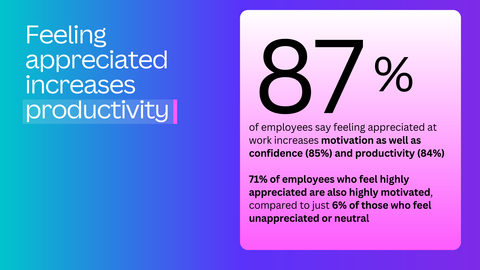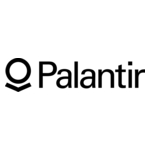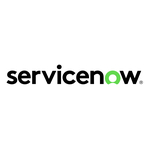81% of appreciated employees report high job satisfaction
New Canva Survey Highlights the Power of Recognition in the Workplace
Maddison Colgate, maddison@canva.com
Canva, the world’s only all-in-one visual communication platform, today released insights from a survey of 1,500 business professionals in the U.S. and Australia, highlighting the strong link between workplace recog
nition and job satisfaction. According to the survey, 81% of employees who feel highly appreciated report elevated job satisfaction, compared to just 7% among those who feel unappreciated or neutral.
This press release features multimedia. View the full release here: https://www.businesswire.com/news/home/20241001404509/en/

Feeli

ng appreciated increases productivity. (Graphic: Business Wire)
The study also revealed that 94% of employees who feel highly appreciated love their workplace, and 91% love their job. In stark contrast, only 18% of those who feel unappreciated or neutral report loving their workplace, and just 33% say they love their job.
Canva conducted this research to explore ways organizations can address the recent decline in workplace engagement. The initiative is part of Canva’s “Love Your Work” brand campaign, which encourages teams to rethink how creativity can bring joy and fulfillment to everyday tasks while achieving their goals.
“At Canva, we’ve always aimed to champion empowerment through our culture, product and community. With our first decade focused

on empowering individuals to design, our second decade is dedicated to empowering organisations and teams to do the best work of their lives,” said Charlotte Anderson, Head of People Experience at Canva.
“Through this research and our Love Your Work campaign, we’re striving to ignite new conversations about transforming workplace cultures with recognition and inclusion playing a key role in that transformation.”
Appreciation Levels Are High, But There’s Room for Growth
In today’s competitive talent landscape, with increasingly distributed workforces, building a strong employer brand that supports retention and engagement is crucial. Cultivating a culture of appreciation is a key factor in that success.
More than half (56%) of emplo

yees currently feel appreciated or very appreciated at work, while 12% feel unappreciated. Several factors influence these sentiments:
- Gender: 63% of men feel appreciated or highly appreciated, compared to 51% of women. Meanwhile, 28% of women feel unappreciated or neutral, compared to 16% of men.
- Work Environment: Of those who feel highly appreciated, 50% work onsite, 35% work hybrid, and 15% work fully remotely.
- Job Title: 74% of employees at VP level or above feel appreciated or highly appreciated, compared to 62% of directors and 53% of employees below director level.
The survey also found that appreciation has a direct impact on performance and attitudes toward work: 87% of respondents said feeling appreciated positively impacts their motivation, while 85% noted it boosts their confidence, and 84% said it enhances productivity. Notably, nearly three-quarters (71%) of employees who feel highly appreciated are highly motivated, compared to just 6% of those who feel unappreciated or neutral.
Gratitude Boosts Job Satisfaction and Employee Experience
A significant majority (88%) of employees believe it’s important for their company to prioritize building a culture of appreciation, yet only 72% feel their company has done so. This presents an opportunity for organizations to close the gap.
Companies with cultures of appreciation see greater employee satisfaction: 81% of employees who are very satisfied believe their company has fostered a culture of appreciation, compared to just 8% of those who are neutral or dissatisfied.
Frequency of recognition also matters. Twenty-one percent of respondents reported receiving recognition a few times a year, 19% a few times a month, 15% a few times a week, and 10% once a year or less. Among those who are highly satisfied, nearly three-quarters (71%) are recognized at least a few times a month. Meanwhile, 50% of neutral or dissatisfied employees are recognized once a month or less, and 27% are never recognized.
Navigating Diverse Generational Preferences Around Appreciation
Today’s workforce is more generationally diverse than ever. As a result, companies must cater to varying preferences for when and how to recognize employees.
While the overall state of appreciation is positive, three in four (75%) of employees still wish they felt more appreciated, with Gen Z leading this sentiment at 83%, followed by Millennials (77%), Gen X (73%), and Boomers (66%).
Interestingly, Gen Z also reports the highest satisfaction with how their employers show appreciation: 77% of Gen Z feel their employer recognizes them in ways they value, compared to 75% of Millennials, 68% of Gen X, and 60% of Boomers.
Employees Want to Be Seen as Individuals
Recognition and affirmation are important, but there’s another key factor in fostering a sense of belonging: employees want to be seen as individuals, not just professionals.
Currently, fewer than half (48%) of employees feel their workplace recognizes their unique qualities and celebrates them as individuals. This percentage is higher for onsite employees (53%) compared to fully remote workers (40%). This sense of individual recognition increases with job rank: 43% of employees below director level feel individually recognized, compared to 55% of directors and 74% of VPs and above.
So, how can employers do a better job of making employees feel seen? The survey revealed that 59% of respondents believe feeling listened to or heard would make a positive impact, while 48% cited flexible work options and benefits, 48% pointed to leadership following through on promises, and 48% highlighted leadership’s commitment to work-life balance.
“While many teams feel appreciated, our research shows that a one-size-fits-all approach to making teams feel recognised and appreciated in the workplace no longer cut it,” added Anderson. “Taking the time to listen and understand what your team needs to do their best work while recognizing individual value and contributions is crucial to ensuring teams feel empowered to learn, grow and achieve their most ambitious goals.”
For more information on Canva’s Love Your Work brand campaign, visit here.
About Canva
Launched in 2013, Canva is a free online visual communications and collaboration platform with a mission to empower everyone in the world to design. Featuring a simple drag-and-drop user interface and a vast range of templates ranging from presentations, documents, websites, social media graphics, posters, and apparel to videos, plus a huge library of fonts, stock photography, illustrations, video footage, and audio clips, anyone can take an idea and create something beautiful.
Methodology
The survey was conducted online by Sago Group, an independent research firm, from August 8-15, 2024, among 1,500 U.S. and Australian corporate employees. Respondents who work in settings where they spend more than 75% of their day on a computer or tablet were invited to participate via email and incentivized through a points program.
View source version on businesswire.com: https://www.businesswire.com/news/home/20241001404509/en/
 Business wire
Business wire 











Add Comment